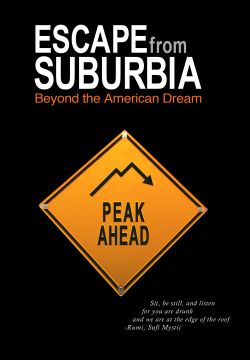 A while back I wrote a short review of 2004’s End of Suburbia, and after watching the sequel, Escape from Suburbia, I guess I’d say roughly the same things.
A while back I wrote a short review of 2004’s End of Suburbia, and after watching the sequel, Escape from Suburbia, I guess I’d say roughly the same things.
I want a movie like this to convince Average Joes. And when it comes to the Romantic agrarian peak oil evangelism this movie traffics in, the Average Joe needs lots of convincing. You’d think the way to go would be to play against stereotype, but to my eye, Escape from Suburbia plays right to it, again and again.
It feels ramshackle and homemade, an assemblage of footage with too little focus, but its real downfall is the characters it chooses to follow. What are the archetypal negative stereotypes of peak oilers? The Dirty F*cking Hippie and the Lonely Conspiracy Theorist.
So we start with Carol and Jan Steinman, a pair of semi-off-the-grid hippies living outside of Portland, who decide to move to Canada and go fully off the grid. They drive there in their hand-painted biodiesel RV.
Then there’s Philip Botwinick, who, we find out over the course of the film, lost his job after 9/11, has been fitfully employed since, and found himself drifting apart from his boyfriend, anxious and dissatisfied. Then he discovered peak oil. It gave him a focus and a circle of friends. He started organizing conferences and joined a CSA. He’s taking it so seriously that … are you sitting down? … he’s selling his comic book collection. (Here the movie veers perilously close to Spinal Tap territory.) Put those fears that peak oil is a cultish collection of the disaffected in search of personal meaning to rest, silly!
Even the experts don’t help much. The usual suspects show up — Heinberg, Homer-Dixon, Kunstler — but they’re allowed to deliver very few facts. There are very few numbers, charts, or graphics, nothing like the coherent factual case Gore built in An Inconvenient Truth. It’s mostly "the end is nigh," delivered with varying degrees of poetry.
As it happens, I enjoyed the movie. I found the scrappy amateurism charming — it’s got the same DIY vibe the movie celebrates. I’m a sympathetic audience, willing to sift through the chaff to get the wheat, of which there is plenty. Anyone who shares concern over oil depletion will find more than enough to chew on and think over. In particular, the scenes around the inner-city South Central Farm community garden in L.A. are gut-wrenching — they might have been the core of a different and more affecting documentary.
In the end, though, there’s just too much here that will put off all but the committed. It’s hard to see this getting past the choir.


